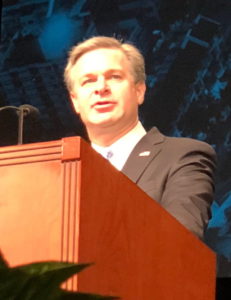FBI Director Christopher Wray Delivers IACP 2018 Keynote:

FBI Director Christopher Wray delivers the keynote address at IACP 2018
To say that FBI Director Christopher Wray is in a precarious position is perhaps an understatement, given criticisms of the agency from the President, and credibility questions related to recent investigations.
But in his opening address at the International Association of Chiefs of Police (IACP) Conference in Orlando this morning, Wray made an effort to assure law enforcement professionals in attendance that they have a steadfast partner in the FBI.
Wray began his calm, measured 30-minute address with a brief assessment of the current law enforcement landscape, citing a litany of threats from cyber security, opioid abuse, active shootings, homegrown extremism and domestic terrorism. And though national security in a post-9/11 world became a top priority of the FBI, “that’s not the case today,” Wray noted.
“We need to stick together,” Wray explained, citing the importance of collaboration between federal, state, local and tribal law enforcement agencies. “Patting ourselves on the back over the successes of the past won’t help us confront the problems of the future.”
He was careful to note that the impact of international law enforcement threats, particularly drug trafficking, is largely felt at the local level. Wray cited one recent case where a suspect from China was caught entering the country with enough fentanyl to impact “half the population of the U.S.” While this claim was not elaborated upon, it elicited an audible gasp from many in the audience.
Wray understood the concerns of the audience, adding that, “We are standing in front of a tidal wave of trouble.” To confront threats like opioids, and other serious issues, Wray cited the FBI’s effort to host regular briefings for federal, state and local law enforcement partners on current and emerging threats, including foreign and domestic issues.
“These [briefings] need to become commonplace,” he explained, adding that efforts to reach out to more jurisdictions to make sure there is a “360-degree understanding of crime” is essential to confront these issues.
Wray noted that in order to understand the dynamics of what propels violent crime, law enforcement must be prepared to explore “new ways of looking at old problems.” It was at this point that he addressed the ongoing threat of school shootings. Wray cited the development of an FBI-led School Safety Summit to develop warning sights for schools, improve strategies to harden “soft targets,” like schools, and, most importantly, protect children.
To accomplish this, Wray suggested improved data collection, adding that the FBI routinely works with local law enforcement to provide on-site training on new data collection procedures.
He also noted the importance of involving public and mental health systems to cross disciplines and improve the approach persistent threats.
“We are also focused on helping victims,” Wray added, noting the importance of compassion and of being involved in the healing and recovery of those who fall victim to crime.
In closing, Wray applauded the work of law enforcement, particularly the persistence of professionals in the space to answer the call to service. In a moment of self-awareness, he laughed at his increasing use of bureaucratic terms like, “robust,” or “force multipliers,” but he said a related phrase sticks in his mind when he thinks of law enforcement as a whole: “greater than the sum of our parts.”